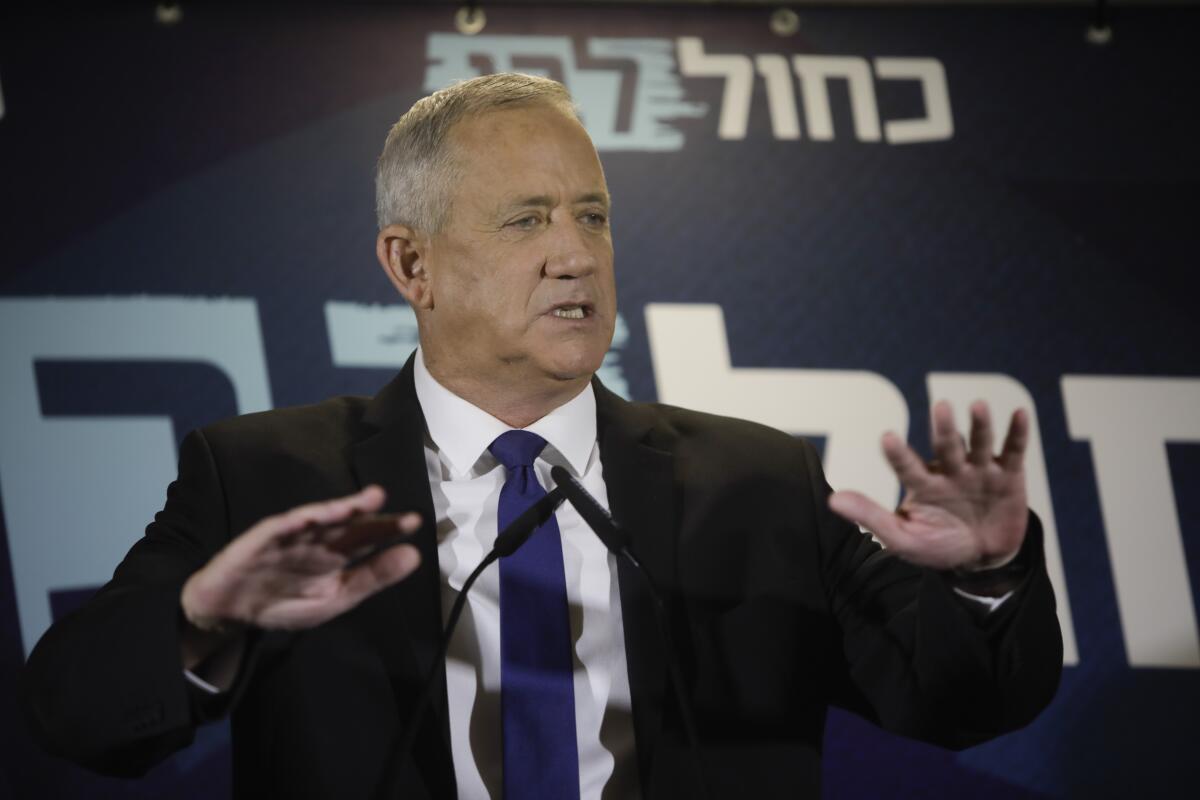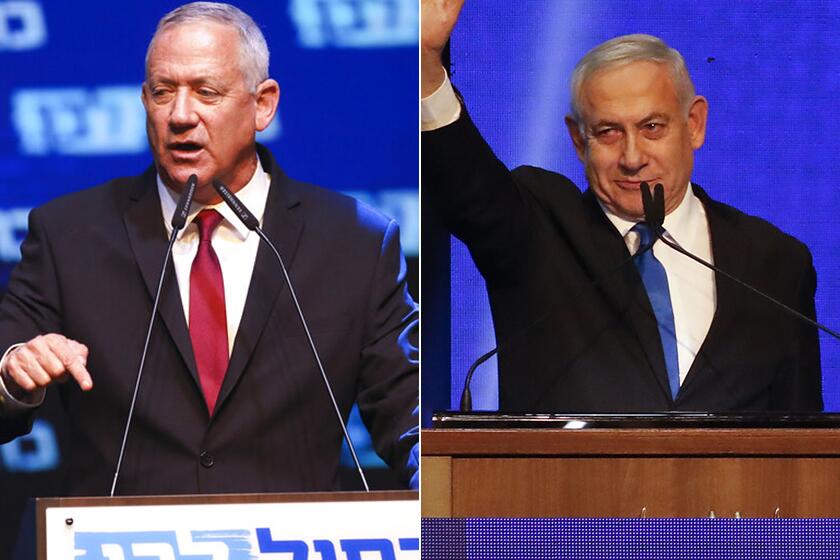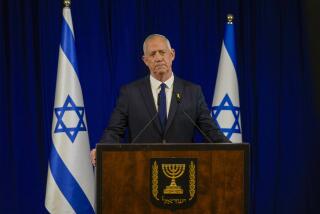Benjamin Netanyahu’s rival Benny Gantz declares victory for his party in Israel election

- Share via
JERUSALEM — Prime Minister Benjamin Netanyahu’s chief rival, Benny Gantz, declared victory after near-final vote tallies on Thursday showed his party slightly widening a narrow first-place finish in this week’s parliamentary elections.
Netanyahu did not challenge Gantz’s declaration.
But as jockeying for control of the government between Gantz, the former military chief of staff, and Netanyahu began, neither appeared close to winning the parliamentary majority they would need to form a government and become prime minister, and weeks of arcane negotiations are expected to start next week.
Official figures have not yet been released, but Gantz’s Blue and White party held two seats more than Netanyahu’s Likud party in the tight race. The Electoral Commission in Israel only releases voting figures, without declaring a winner.
Gantz, 60, will have to find political partners in order to form a government, and he responded coolly to an overture from Netanyahu, who suggested their two parties team up.
“The country has chosen unity,” Gantz said Thursday. “The country has chosen Israel first. Blue and White, headed by me, has won the election. Blue and White is the largest party. Netanyahu did not succeed in reaching the political bloc that he aimed for — 61 Knesset members — on the basis of which these elections were held.”
Gantz and his opposition party have held a steady lead over Netanyahu and his conservative Likud party as the count has proceeded.
On Thursday, Israel spun into political melodrama as Netanyahu attempted to grab the momentum ahead of negotiations to form a government even as Gantz appeared to be cementing his slight lead.
Prime Minister Benjamin Netanyahu’s Likud party falls short of a parliamentary majority in Israel’s election, putting him in dire political peril.
Netanyahu began the day by securing the signatures of all right-wing party leaders on a document of loyalty, in which they committed only to join a government under his leadership.
Immediately, he posted a video beseeching Gantz to join him in a national unity government, bringing the two largest parties in Israel together under one roof — under his leadership.
Gantz had campaigned on the promise that he would not join any government with the participation of Netanyahu, who is under a legal cloud as he confronts imminent indictment on several corruption charges.
Gantz rejected Netanyahu’s overture, saying that, as head of the largest party in Israel, he himself planned to “lead a government of national unity and liberalism.”
Netanyahu then expressed “disappointment” at what he called Gantz’s recalcitrance in the face of a national need for unity.
Gantz’s party appears to have won 33 seats in the Knesset and Netanyahu’s Likud 31 seats. The support of at least 61 seats in the 120-member parliament is needed to form a government.
Gantz can count on the support of Labor, which has six seats, and the left-wing Democratic Union, which has five.
Then things get complicated.
Former Defense Minister Avigdor Lieberman’s secular nationalist party has eight seats but has said it won’t join a government with the Arab-majority Joint List party, which holds 13 seats. Meanwhile, some Joint List members would probably peel away from joining with Gantz if Lieberman was involved in the coalition.
Netanyahu, for his part, currently has the support of 55 seats.
President Reuven Rivlin, tasked with choosing who will be given the first chance to form a new government, late Thursday published his list of consultations for Sunday — with Gantz’s party at the top.
Entering the fray, Jason Greenblatt, President Trump’s Mideast envoy, announced that he would be arriving in Israel to hold separate discussions with Netanyahu and Gantz on Trump’s long-anticipated peace deal for Israelis and Palestinians.
Trump has been restrained in his comments regarding the fate of Netanyahu, who has arguably been his closest and most constant ally on the international stage. Trump engaged in several overt acts of support for Netanyahu during the previous electoral campaign, inviting Netanyahu to the White House in March, weeks ahead of the vote and recognizing Israel’s sovereignty over the Golan Heights, a major diplomatic achievement for Netanyahu.
On Tuesday, Trump told reporters at the White House that he had not spoken with Netanyahu, adding, “our relations are with Israel.”
Tarnopolsky is a special correspondent.
More to Read
Sign up for Essential California
The most important California stories and recommendations in your inbox every morning.
You may occasionally receive promotional content from the Los Angeles Times.











